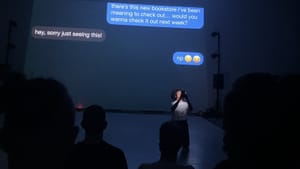Stay in the Loop
BSR publishes on a weekly schedule, with an email newsletter every Wednesday and Thursday morning. There’s no paywall, and subscribing is always free.
It’s always screen time
Philly Fringe 2024: Leigh Huster presents sorry just seeing this

We’ve all experienced it: “Sorry just seeing this.” It’s one of the happiest endings to a text thread silence and one of the few fairytale endings that still exist. In their Cannonball Festival production, sorry just seeing this, performers Leigh Huster and Chloe Marie explored how smartphones and the norms we’ve formed around them can bring two people closer together while isolating them from the rest of the world.
The show opened with an announcement: “Please turn your phones on! Volume, up! Notifications, on!” So it took a few moments to begin, as the audience inevitably replied to that one last text, checked one last thing on their browser.
Onstage and onscreen
The lights dropped, but the phone screens remained in the audience and onstage as Huster and Marie texted back and forth, their messages projected on the wall. As the play began, the thicket of notifications, buzzes, and ringtones grew even denser—oh wait, they were texting the audience, too.
Amid the flurry of messages, it quickly became clear there was a bit of a crush playing out before us: Huster and Marie had just gone on a date, and it was a success. The text thread was tripping over itself with all the fluttering exchanges of a budding romance when Huster fell asleep and left Marie texting into deafening silence.
Beyond the relationship playing out on stage, there was also the question of audience involvement. The production was aware of the many ways a phone can shape relationships beyond two endpoints. The audience group message immediately generated a sense of closeness among the audience and performers; the show’s closing selfie reinforced it. The final message from Huster in the thread was humorously disillusioning: “ps: URL to vote for the fringies” with a trophy and a kiss emoji.
A conversational dance
The show’s rhythm was characterized by this sort of punctuation—intensive texting between two individuals that isolated them from the audience, then pulsing music and expressive dances that revealed their inner state with an expressiveness that emojis will never touch.
The set was spartan and effective: the only backdrop was a screen that projected Huster and Marie’s silent conversation, and most of the play took place in darkness that felt alternatively like a bedroom or the inside of each character’s mind. Marie’s dance solo as Huster sleeps was a highlight.
Deft and charming
In barely 45 minutes, the show managed to manifest the giddy interplay between intimacy and technology. The play is both deft and charming, with the zappy energy of a SnapChat conversation and the ebullience of a new crush. Much of the credit for this goes to Marie and Huster’s obvious chemistry as performers, as well as to Julia Bryck’s dramaturgy and Aaron Pond’s musical contributions. (Pond is a fellow BSR writer.)
With just three performances, sorry just seeing this wrapped up the Fringe Festival’s Cannonball hub this year. Both Huster and Marie participated in additional Fringe shows this year, and I hope they’ll return in 2025. In the meantime, the show’s group chat lives on in the way of everything on my phone and yours.
What, When, Where
sorry just seeing this. By Leigh Huster; performed by Huster and Chloe Marie. September 2, 8, and 29 at Icebox Project Space Gallery, 1400 N American Street, Philadelphia. (215) 413-1318 or phillyfringe.org.
Accessibility
Icebox Project Space Gallery is a wheelchair-accessible venue with gender-neutral restrooms.
Sign up for our newsletter
All of the week's new articles, all in one place. Sign up for the free weekly BSR newsletters, and don't miss a conversation.

 Helen Walsh
Helen Walsh